Are HK's gay writers happy?
Updated: 2018-07-20 07:11
(HK Edition)
|
|||||||||
While many among the city's LGBT writers struggle with the fear of discrimination, stories of small victories keep seeping out of the closet, finds Melanie Ho.
When Hong Kong author Nigel Collett first began looking into the 1980 death of John MacLennan, a Hong Kong police officer whose death came hours before he was to be arrested for committing homosexual acts, Collett was unsure what he would find. 
"When I first came to the case, I knew it was something quite important for Hong Kong history," he says. "The handling of the case says quite a lot about how the colonial government behaved in Hong Kong. It was quite important as it changed the law on homosexuality in 1991. When I started to read the material and got to know more about the man at the center of the case, I thought it was time to write his story. No one had done him justice."
Collett first came to the project in 2011, following a suggestion from his friends, Aileen and Ken Bridgewater. Collett had been aware of the case. After finishing his biography of Leslie Cheung, he was looking for a new project. After five years of research and writing, Collett completed the manuscript in 2016. A Death in Hong Kong: The MacLennan Case of 1980 and the Suppression of a Scandal was published in March 2018 by City University of Hong Kong Press, having won the Royal Asiatic Society Hong Kong History Book Prize in 2017.
"I felt a responsibility to get this one right," Collett says. "I was quite conscious that the book would be controversial and I felt responsible to John MacLennan to get it as right as I could. In the early days, it was a bit intimidating. But I was determined to get on with it, despite feeling the weight on my shoulders. I wasn't doing something fun - I couldn't screw it up."
The result is a thoughtful, comprehensive and thoroughly researched book, one that puts MacLennan's death in a historical and social context.
Safety first
While two of Collett's three books have been about LGBT issues, the writer says this is a coincidence. "The first book was straight military biography. I was invited to write about Leslie Cheung as an actor and a singer and it wasn't specifically because of the gay element, and for this one (MacLennan case) I hadn't gone looking for it."
While Collett would be happy to tell more stories of sexual minorities, he's also aware that finding the information isn't easy. "I was lucky with Leslie Cheung and the John MacLennan case was in the public record, but when you go looking for others, it's very tricky."
In 2008, Collett co-founded the Tongzhi Literary Group, an organization that fosters writing by the sexual minorities in Hong Kong. After moderating a session for the Hong Kong International Literary Festival on gay writers in Hong Kong, Collett was inspired to start a group with some of them.
"It was quite an eye opener, finding eight local Hong Kong Chinese writers for the panel," he says. "None of them knew each other. A couple didn't want to be on the panel and sat in the audience. There was no culture of writing, they never got together."
Collett says the local Chinese LGBT writers have it a lot tougher. "Some of them have to be extraordinarily careful in not identifying who they are. An example would be that the best and most widely read writer of Chinese novels cannot identify who he is and writes under a pseudonym. Hong Kong's best in the writing world is still in the closet."
Hong Kong historian and writer Jason Wordie agrees. Wordie, who has published five books on local history and is a newspaper columnist, says that more opportunities for LGBT writers are needed, but "the opportunity comes down to whether people are safe to write". "I say this because Hong Kong doesn't have any anti-discriminatory law. Someone who may want to write with an LGBT theme might say 'I can't' or 'I can write that, but I can't publish it' or (it has to be) under a pseudonym just for safety reasons."
Collett, who is now working on a biography of E. M. Forster, agrees. "There needs to be an anti-discrimination law in terms of sexual and gender identity to make it safe. The second area is education. The Hong Kong education system is in dire need of some form of education."
Wordie's approach to incorporating LGBT themes into his own writing focuses on how these integrate into the bigger story. "When I've included an LGBT theme in my writing, it's part of the bigger tapestry rather than being in the forefront. It needs to be worth saying, rather than a visibility issue," he says. "In some of my columns, I've included gay points and themes if I felt it mattered."
Say it with pride
Local English-language publisher Signal 8 is supporting writing by the sexual minorities by publishing two anthologies due out later this year.
"We're bringing out a couple of LGBT+ anthologies, one of short stories and one of non-fiction," said Anshuman Das of Signal 8 Press. "The view is to provide a snapshot of LGBT writing in the region. The last LGBT anthology in the region was a long time ago and we'd like to kind of revive that."
All three writers agree there needs to be more opportunities for sexual minorities to write and be published. Wordie also puts the issue of opportunity into the larger context of the arts and arts funding.
"I see it as a wider issue - the drive toward quality and a recognition of the fact that producing art costs money," he says. "Quality needs some form of subsidization. All this is linked into the wider issue of identifiable quality. I'd like to go for quality and visibility."
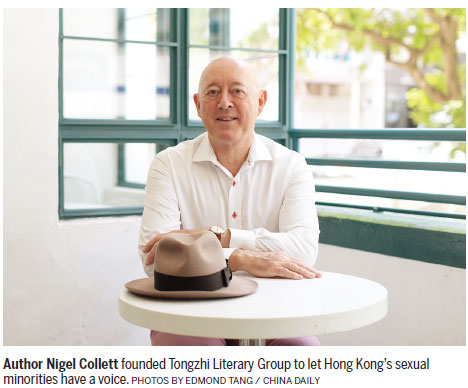
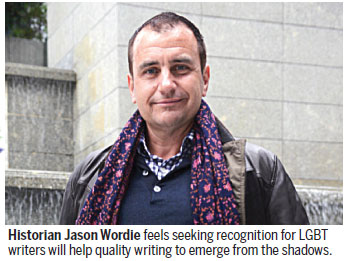
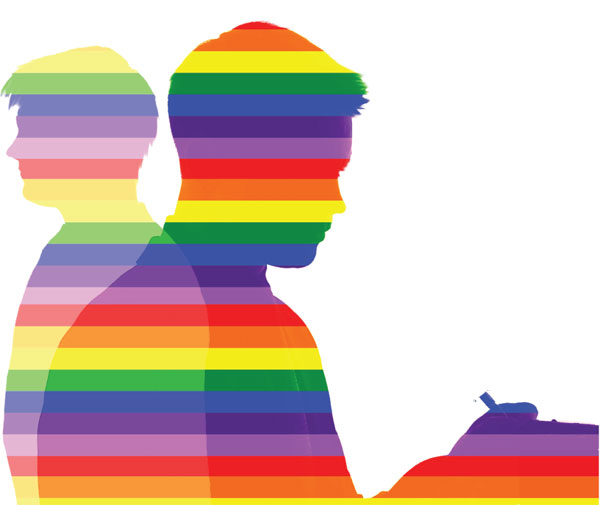
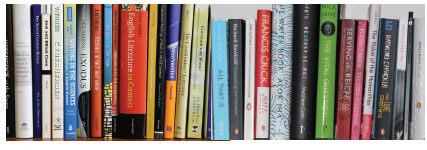
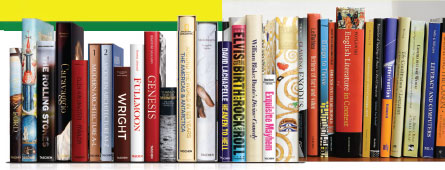
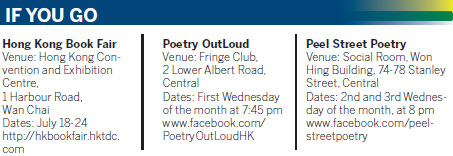
(HK Edition 07/20/2018 page9)